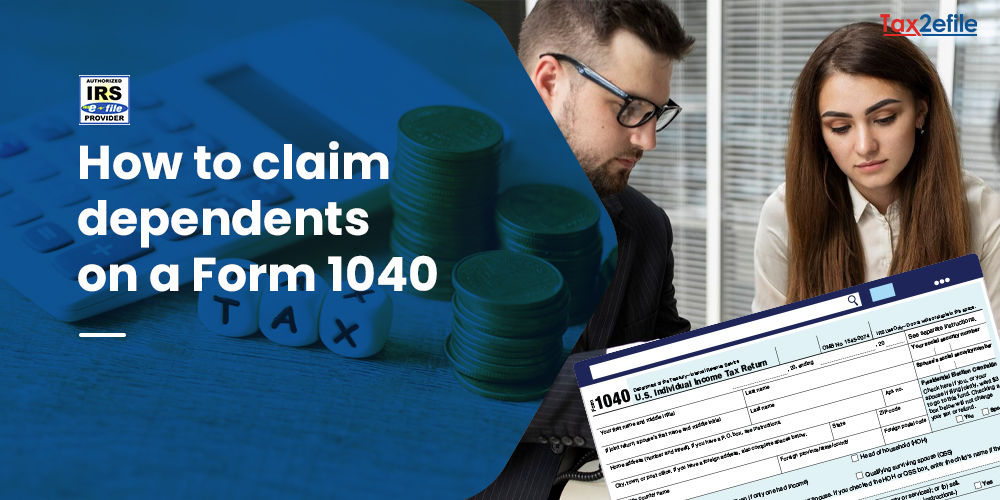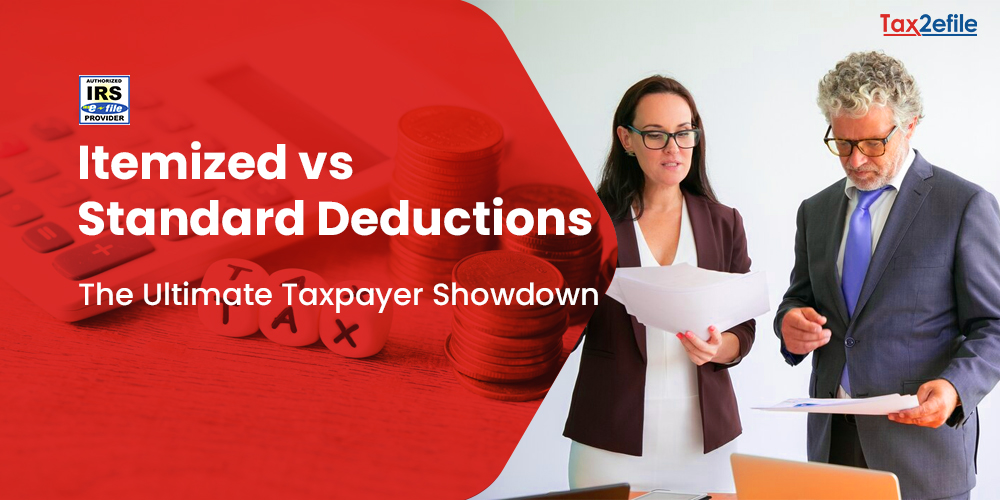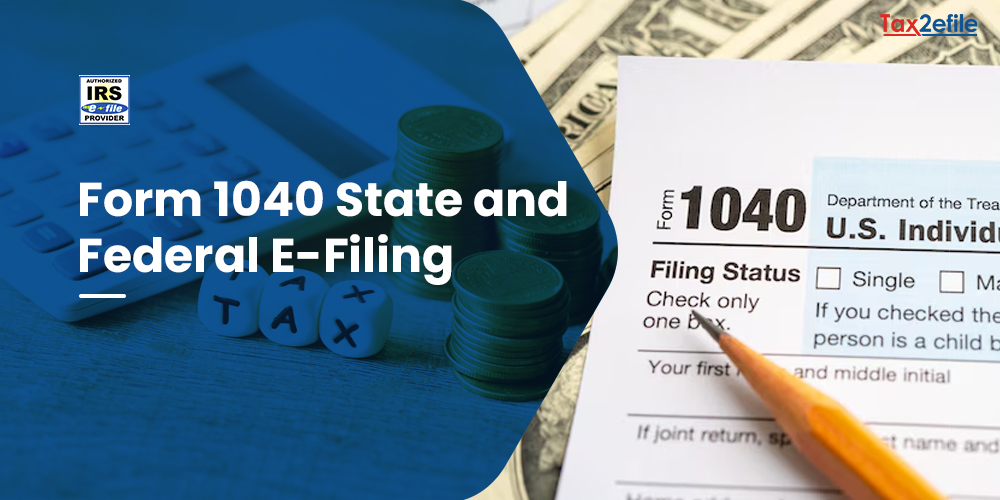- May 14, 2024

Taxpayers while preparing their federal income tax return, should seek for every possible deduction to decrease the amount of tax they owe to the Internal Revenue Service. One way to claim federal tax returns is to claim children and other qualifying relatives as dependents. Each dependent that the taxpayers claim will lower the taxable income they owe. But, in order to claim someone as dependent, they have to fulfill the age, relationship, residency, and other requirements. Let us discuss the eligibility criteria for qualifying dependents and the benefits of claiming the same here.
Claiming Dependents on Your Tax Return
Taxpayers should generally use IRS Form 1040 or 1040A to file their income taxes. On the first page of their tax return, the taxpayer should enter the complete names of their dependents, their social security numbers, and their relationship with the taxpayer. This will help reduce the taxes they owe considerably. If there are more than four dependents, then the taxpayer has to check the appropriate box in the tax Form and complete their related information on a separate page.
While claiming the child as a dependent, it is important that the child lives with the parents for more than half of the year and they don’t provide more than half of their own financial support. The child should be under the age of 19 years. The upper age limit for dependents is 24 years if they are full-time students. If the parents share custody of the child with their former spouse, then they can claim only one child as their dependents.
Taxpayers can claim one exemption for each dependent they claim, along with themselves and their spouses. After entering all the information pertaining to the dependents, the tax form allows the taxpayer to check a box in the tax form for each dependent that qualifies the taxpayer to claim the child tax credit. Generally, they can claim tax credits for all dependent children under the age of 17 years during the tax year. If the taxpayer qualifies, the child tax credit offers a dollar-for-dollar reduction of all the final tax debt for the tax year.
Who Can be Claimed as Dependent?
A dependent is a qualifying child or a relative who relies on the taxpayer for financial support. Inorder to claim a dependent for tax credits and deductions, the dependent must meet certain requirements. The general rules for qualifying as dependents are as follows,
- The dependent should be a citizen of the United States, a resident alien, or a resident of Mexico or Canada.
- An individual cannot be claimed as a dependent on more than one rare return, except with rare exceptions.
- The dependent can’t claim a dependent on their own tax return.
- The taxpayer cannot claim their spouse or a dependent if they file the tax returns jointly
- The dependent should be a qualifying or a qualifying relative.
The terms of a qualifying child, given by the Internal Revenue Service, as as follows.
- The child should be the son, daughter, stepchild, or eligible foster child of the taxpayer
- The child can also be a brother, sister, half-sister or brother, step-sister, step-brother, or adopted child of the taxpayer.
- Dependents should be under 19 years old and can be under 24 if they are full-time students.
- The dependent can be of any age if they are totally or permanently disabled.
- It is important that the dependent lives with the taxpayer for more than half the year and gets financial support from the taxpayer.
- The taxpayers should not file as married and filing jointly unless they claim a refund of taxes paid or the taxes withheld.
Claiming Relatives as Tax Dependents
To be a qualifying relative, a person must be a child or the descendant of a child, a sibling, a stepsibling, a parent or stepparent, an ancestor of a parent, an uncle or aunt, or a father-in-law or mother-in-law. The terms of qualifying dependents are as follows. The qualifying relative should meet these general rules for the dependents and pass these tests.
- The qualifying relative should not be a qualifying child of the taxpayer.
- The qualifying taxpayer should lie with the taxpayer as a member of their household.
- They should have a gross income under $4,700 and should get more than half of their financial support from the taxpayer.
For the dependent to be a qualifying relative, the taxpayer should provide more than half of the support. For the taxable years starting from 2023, the standard deduction amount for an individual who can be claimed as a dependent by another taxpayer cannot exceed $1,250 or the sum of $400 and the individual’s earned income, whichever is greater.
Benefits of Claiming Dependents on Tax Returns
Claiming benefits on the tax returns helps to reduce the tax credits and lowers the overall tax liability of the taxpayer. A dependent can only be claimed to be a single taxpayer in a tax year. By claiming dependents, the taxpayer gets tax credits that can lower the amount of tax they owe on a dollar-for-dollar basis. The tax deduction would lower their taxable income, and the taxpayer would owe less tax. The taxpayer can actually claim a number of tax credits and deductions if they have a dependent
Child Tax Credit
The CTC, or the child tax credit, is a tax benefit that is granted to the taxpayers of each qualifying dependent child. The maximum amount of the CTC is $2000 for each qualifying child. This credit, however, starts to phase out when the adjusted gross income of the taxpayer exceeds $200,000. The refundable portion of the credit, also referred to as the additional child tax credit,, is about $1700 for the tax year 2024.
Earned Income Tax Credit
The EITC is the refundable tax credit, that decreases the amount of tax the citizens own on a dollar-for-dollar basis. This credit is also available for taxpayers who don’t have children, and those with dependents will receive a higher credit. This credit will increase, with the addition of each child to a family of up to three children.
Child and Dependent Care Credit
The child and dependent care credit provides relief to parents who pay for the care of a qualifying child. It also pays for a disabled dependent, while they are looking for work. Depending on the income of the taxpayer, they may qualify for both the child tax credit and the child and dependent care credit. They can include up to $3000 of eligible expenses and $1,050 of credit if they have one qualifying dependent while the amount raises to $6000 of eligible expenses and $2100 of credit if they have two or more dependents.
Recent Changes on Dependent Tax Rules
The recent $78 bipartisan tax package includes the child tax credit changes, that could affect millions of families filing the 2023 tax returns. After the enactment of this legislation, eligible families could get an average tax cut of $680 for 2023 taxes. Currently, the child tax credit is worth up to $2000 for one qualifying child under the age of 17 years. Up to $1600 of this credit is not refundable for 2023, which means that the credit could offer a refund, even if the taxes owed are zero. The refundable portion of the child tax credit could increase to $1,800 for the tax year 2023, $1900 for 2024, and $2000 for the year 2025.
Forms for Filing Dependents Tax Credit
Tax payers can make use of the IRS tax Forms 1040 or 1040A to file the tax returns for dependents. This Form is meant for filing individual tax returns, and the same can be used for claiming credits for dependents as well. Whether taxpayers choose to file this form independently or seek professional assistance, the expert team at Tax2efile is dedicated to offering expert information and tax filing guidance. As an IRS-accredited tax filing firm, it helps taxpayers to e-file their tax returns on time and helps them maximize their refunds while ensuring accurate filing, to avoid penalties. Taxpayers can benefit from exceptional customer support and peace of mind throughout the tax filing process.
Maximize Your Tax Refund: Claim Dependents and Get Valuable Credits
Taxpayers can quote tax dependants on their returns and can score big tax breaks. The qualifying dependent could be a child or a relative who meets certain criteria and avails huge returns on taxes. By reporting them, the taxpayer can avail a child tax credit of up to $2000 and the child and dependent care tax credit of $3000. Taxpayers can get help from professional tax filing agencies like Tax2efile to report this information accurately and avail tax benefits from the IRS. Their dedicated team of tax professionals would offer a smooth and stress-free filing process, helping tax filers to file tax returns on time and avail refunds. They also offer professional advice of ways to report dependents after checking if they actually qualify for reporting.


